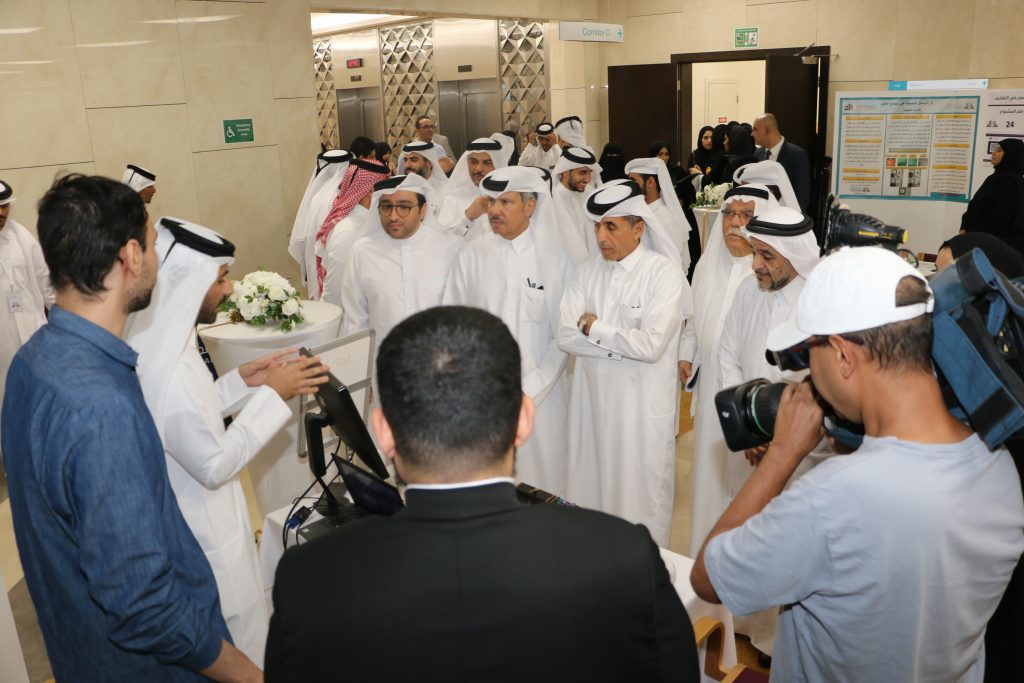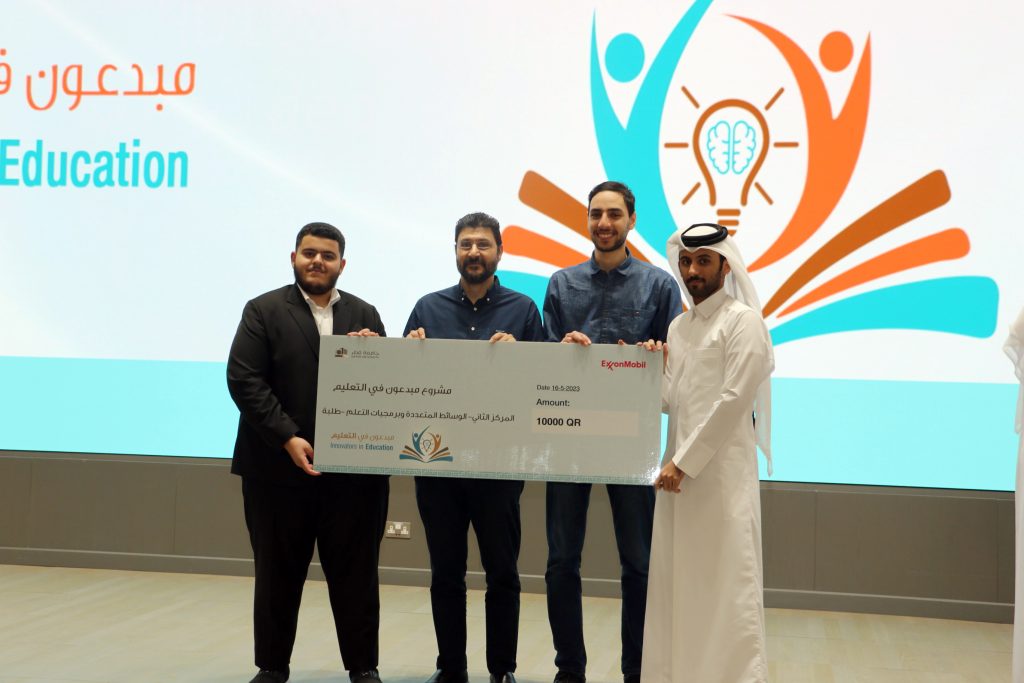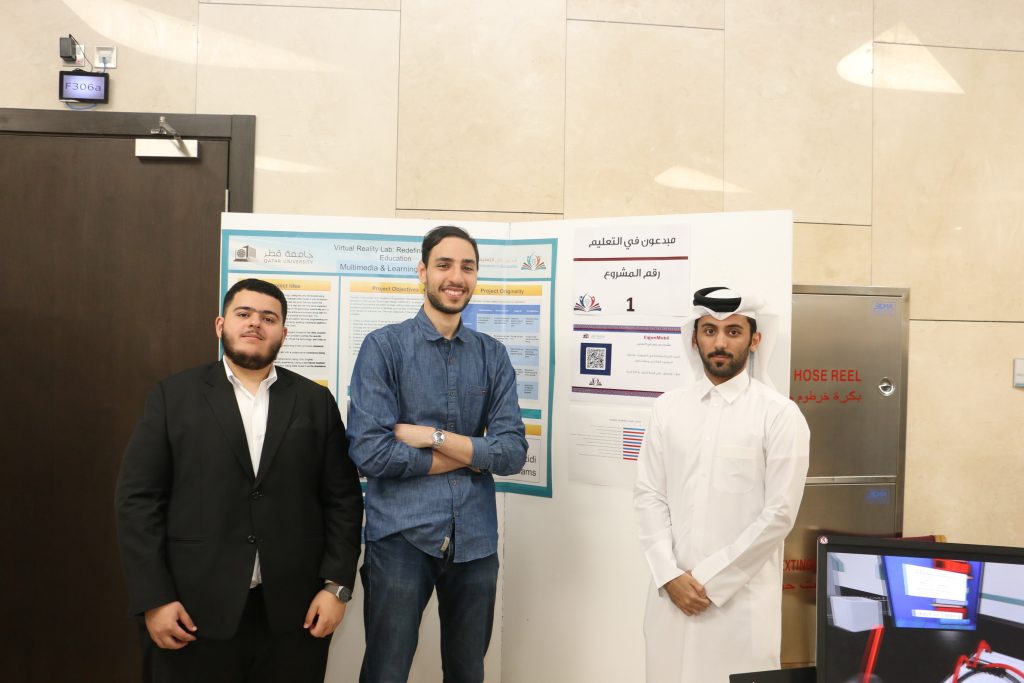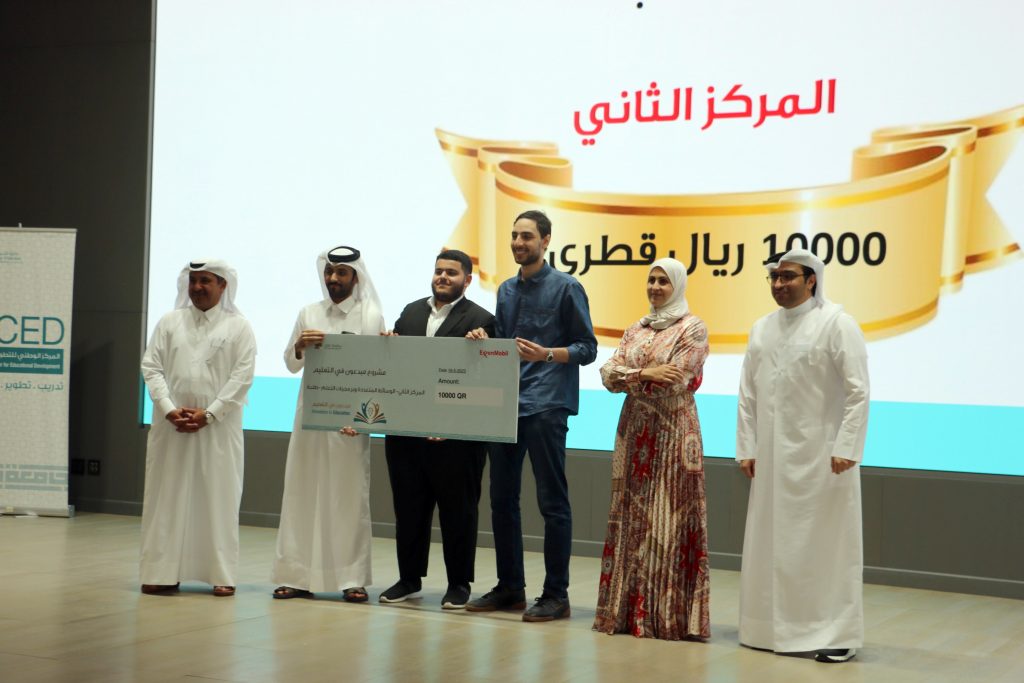Home » Articles posted by farah.am.q (Page 9)
Author Archives: farah.am.q
Recent Posts
- CSE faculty receives research funding from Google
- CSE SDP Contest Day Fall 2025
- QU Students Win First Place at the AIX Summit Hackathon!
- CSE Faculty Secures QRDI Grant Award for AI-Integrated Islamically-Grounded Psychotherapy
- CSE Dept. Honored at Huawei’s “Innovation in Education and Talent Excellence” Event
Archives
- December 2025
- November 2025
- September 2025
- August 2025
- May 2025
- February 2025
- January 2025
- December 2024
- November 2024
- September 2024
- June 2024
- May 2024
- April 2024
- March 2024
- February 2024
- January 2024
- December 2023
- November 2023
- October 2023
- September 2023
- June 2023
- May 2023
- April 2023
- March 2023
- February 2023
- January 2023
- December 2022
- November 2022
- October 2022
- September 2022
- August 2022
- May 2022
- April 2022
- March 2022
- February 2022
- January 2022
- December 2021
- November 2021
- October 2021
- September 2021
- August 2021
- July 2021
- May 2021
- April 2021
- March 2021
- February 2021
- January 2021
- December 2020
- November 2020
- October 2020
- September 2020
- August 2020
Categories
CSE faculties win the best paper award at IWCMC23
June 23, 2023 / Leave a comment

A collaborative team including two CSE faculty members has received the best paper award at the International Wireless Communications and Mobile Computing Conference (IWCMC23), held in Marrakesh, Morocco, between June 19-23, 2023. The awarded paper is titled “Real-time Imitation of Autonomous MCG Node using Dual ECG Probing IoT Node Suitable for Delivery by UAV”, and co-authored by Dr. Khalid Abualsaud and Dr. Elias Yaacoub from our department.

The paper is an outcome of research project NPRP13S-0205-200270 from the Qatar National Research Fund (QNRF) led by Dr. Khalid Abualsaud. The work was done in collaboration with Prof. Tamer Khattab (Dept of Electrical Engineering at QU) with medical advice from collaborators from Al-Ahli Hospital (a partner in the project) and the New York Presbyterian Hospital.
The work consists of building a testbed that uses electrocardiography (ECG) signals to generate magnetocardiography (MCG)-like signals, which can be used for various heart disease detection, including arrhythmia. A working prototype is built with weight and dimensions suitable to be carried by drones, for delivery to remote areas lacking medical infrastructure, e.g., in disaster recovery scenarios.”
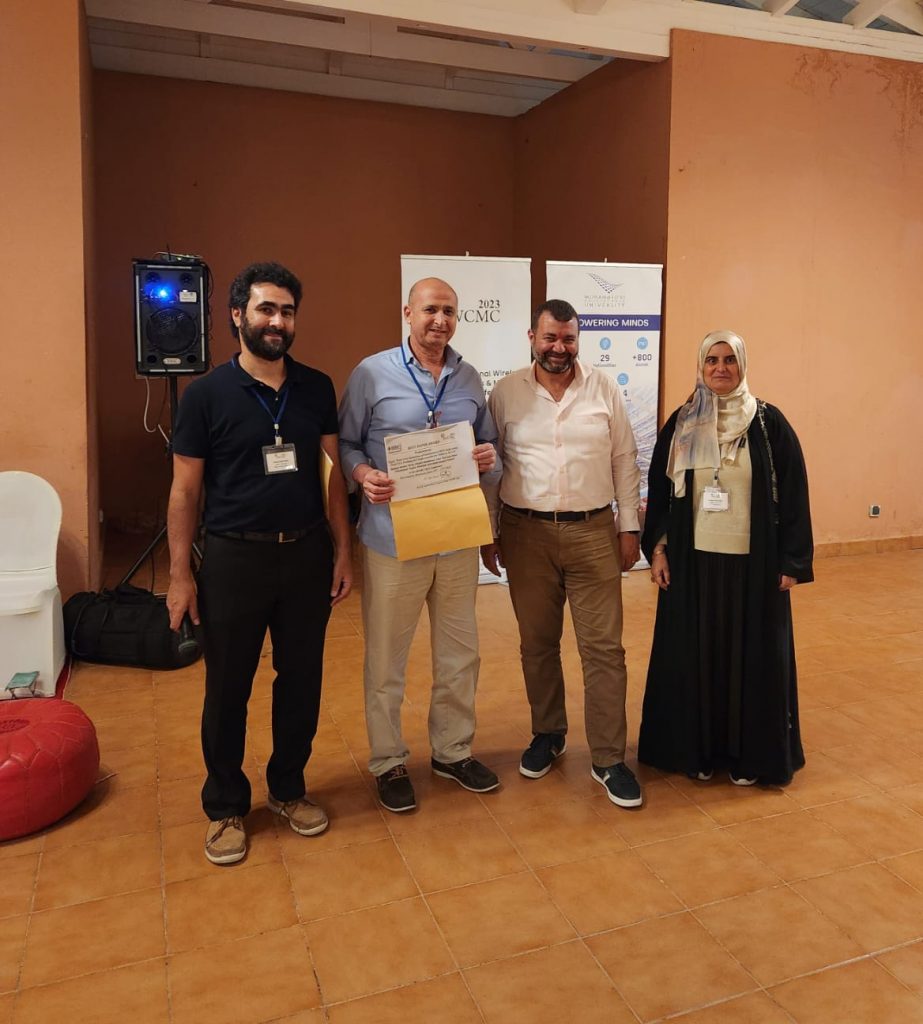
CSE faculties were awarded at CENG End of Year Event
June 13, 2023 / Leave a comment
Three CSE faculty members have received awards at the College of Engineering End of Year ceremony held on 13 June 2023.
Dr. Tamer Elsayed was awarded the “Dean’s Award for Excellence in Research” for his research work.
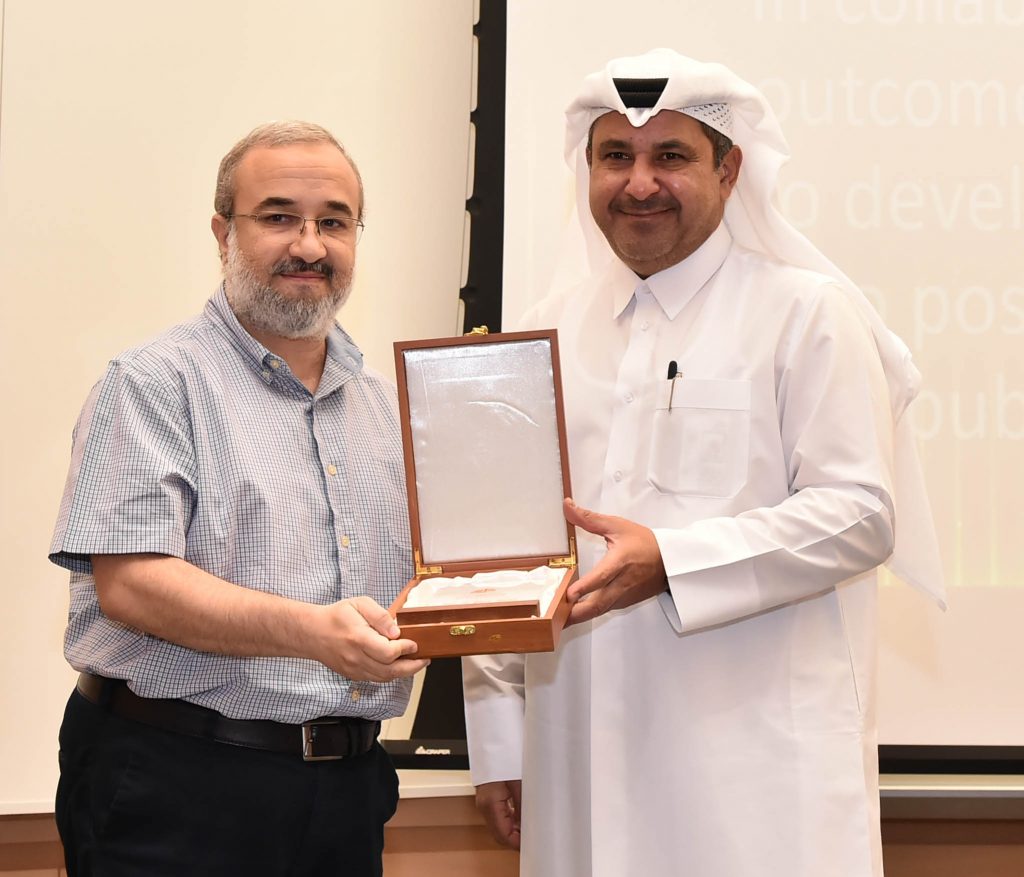
Eng. Heba Dawoud was warded the CSE department Excellence in Services award.
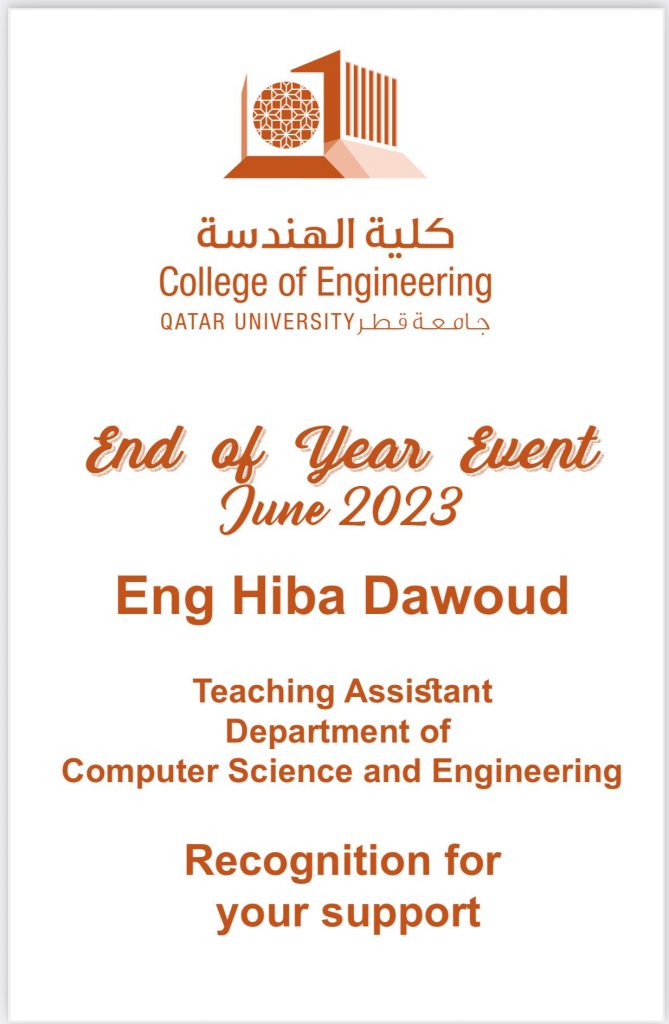
Finally, Dr. Abdulla Al-Ali was recognized by the College of Engineering for the end of his tenure as the CSE Head of Department.
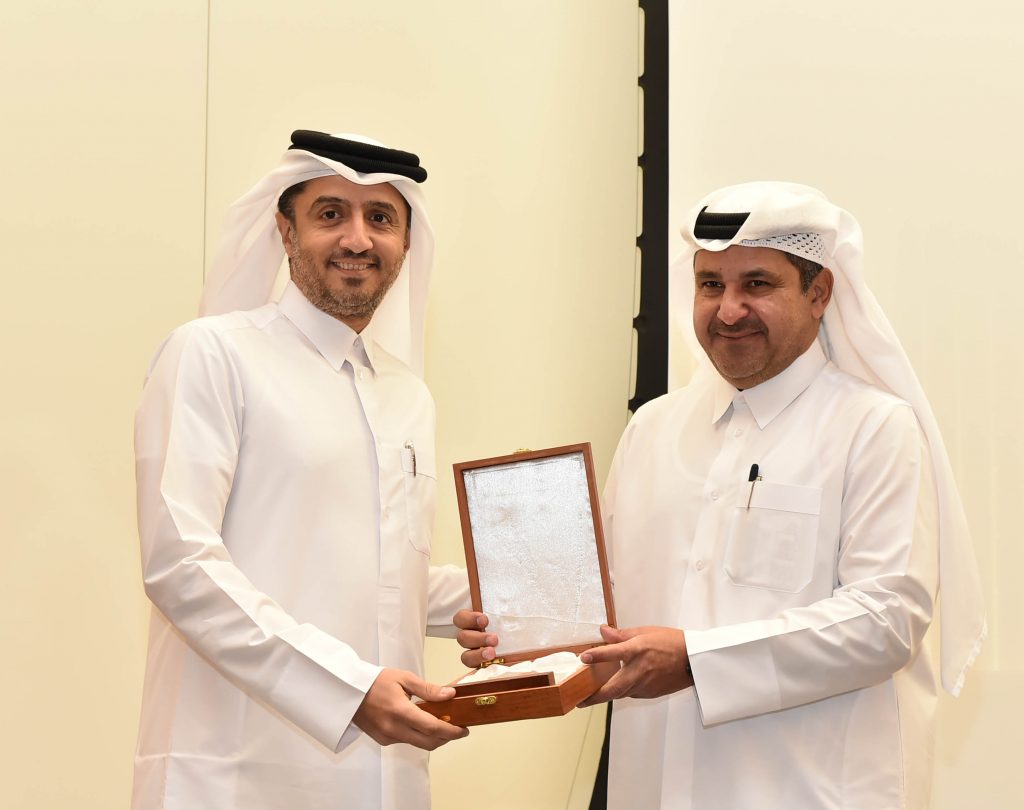
CSE faculties contribute to QU 14th Excellence Day
June 13, 2023 / Leave a comment

Two CSE faculty members have delivered talks at the QU 14th Excellence Day event, themed “AI in Higher Education: Navigating the Future., which was organized by the QU Center for Excellence in Teaching and Learning (CETL) on June 13, 2023.
Prof. Junaid Qadir delivered a plenary talk titled “Educating for the AI Revolution: Fostering a Holistic Human-Centered Approach Based on Wisdom and Multiplexity”. The talk attracted a packed audience consisting of QU faculty members and external guests. During the talk, Prof. Qadir introduced the audience to the opportunities and challenges presented by new general-purpose AI developments. He highlighted the disruptive impact of these tools on higher education and emphasized their potential to enhance human intelligence, capabilities, and productivity. However, he also stressed the importance for educators to be cautious of limitations such as biases, hallucinations, and misinformation. The discussion further explored effective strategies for higher education to adapt to these dynamic times, ensuring social welfare, enhanced human capabilities, inclusivity, and openness.
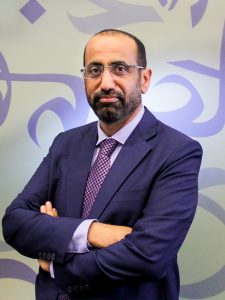
Additionally, Dr. Saleh Alhazbi delivered a presentation titled ‘Learning Analytics from prediction to prescription’ during the same event. The presentation highlighted the ongoing efforts in utilizing AI to analyze students’ traced data collected by learning management systems (LMS), and how the objective has been shifted from solely predicting students’ performance to providing proactive feedback aiming to enhance their learning experience. Furthermore, the presentation provided insights into the challenges related to learning analytics. These challenges encompassed ethical considerations, the impact of learners’ internal conditions like motivation, the influence of external conditions such as the nature of the subject being studied, and the role of instructors in the learning process.
CSE Faculty Awarded QJRC Grant
May 31, 2023 / Leave a comment
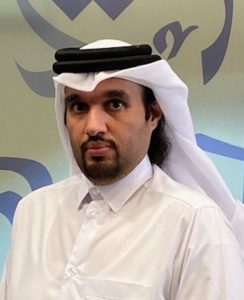
Dr. Mohammed Al-Sada, assistant professor at our department, and his team has been awarded a Qatar-Japan Research Collaboration (QJRC) cycle2 grant for the project titled: “A Versatile Telexistence System with Implicitly Assistive Telemanipulation Capabilities”.
QJRC, funded by Marubeni, brings together Qatar University and Japanese Universities to collaborate on research topics of mutual interest and develop high-quality, high-impact outcomes and prototypes that benefit both parties. QJRC paves the way for sustainable cooperation and helps, in a concerted manner, to fulfill the knowledge-based economy aspiration of Qatar.
The project’s team includes:
– LPI: Mohammed Al-Sada, Qatar University, Doha, Qatar.
– LPI: Prof. Tetsuya Ogata, Waseda University, Tokyo, Japan.
– PI: Prof. Tatsuo Nakajima, Waseda University, Tokyo, Japan
– PI: Dr. Osama Halabi, Qatar University, Doha, Qatar.
– PI: Dr. Faisal Al-Jaber, Qatar University, Doha, Qatar.
– PI: Dr. Sarada Prasad Dakua, Hamad Medical Corporation, Doha, Qatar
– PI: Dr. Pin-Chu Yang, Waseda University, Tokyo, Japan
– PI: Mr. Abdulla Iskandar, Waseda University, Tokyo, Japan
– PI: Mr. Naoki Hashimoto, Waseda University, Tokyo, Japan.
– Consultant: Dr. Yamen Saraiji, Sony AI, Tokyo, Japan.
Here is the project’s abstract:
In recent years, Qatar has faced pressing challenges in knowledge exchange and collaboration with the world across industrial and educational sectors. In response to such challenges, we fabricated a wearable telexistence system that can be used for knowledge transfer and remote collaboration tasks as part of QJRC-1. This proposal builds upon our system by addressing its key limitations through two main objectives. First, we propose a novel robot formfactor that enables the wearable robot to dock into a mobile robotic platform, that we called the Yorishiro system. This system provides stability, power, and enables using the robot in three Modes: i) Wearable Telexistence Mode: the robot is a fully worn system. ii) Augmented-Wearability Mode: the robot is worn by a surrogate user while attached to the Yorishiro System. iii) Mobile Telexistence Mode: the robot is completely independent from surrogate users and is a fully mobile system. Therefore, the Yorishiro system significantly increases the reliability and stability of the robotic system, and extending its usage and deployment domains for industrial and medical contexts.
The second objective is concerned with increasing the efficiency and accuracy of telemanipulation task by developing an implicitly assistive telemanipulation system for telexistence (ATX). Our ATX system mainly focusing on helping the robot operator to grasp tools with consideration to their affordances through deep learning based detection and motion generation method. ATX implicitly assists users by compensating operational errors during telemanipulation, thereby maintaining embodiment over the robot that is necessary to telexistence. The contributions of these objectives are significant, as we explore efficient novel formfactors for telexistence systems, and integrate assistive methods to ensure operational efficiency of the robot. To the best of our knowledge, these objectives have not been explored in any previous research, and advance the state of the art in telexistence systems.
CSE Best Senior Projects 2023
May 28, 2023 / Leave a comment
On May 25th, the highly anticipated senior projects’ presentations took place at the state-of-the-art new engineering building H07. These remarkable projects, the culmination of tireless efforts by talented students, were subjected to rigorous evaluation by industry examiners. After careful deliberation, three outstanding projects from each program, Computer Science (CS) and Computer Engineering (CE), emerged victorious. These exceptional teams have been chosen to proudly represent our department in the upcoming college contest day on June 11th. We eagerly anticipate the success that awaits our representatives as they compete at the college level, and we are confident in their abilities to make our department proud once again.
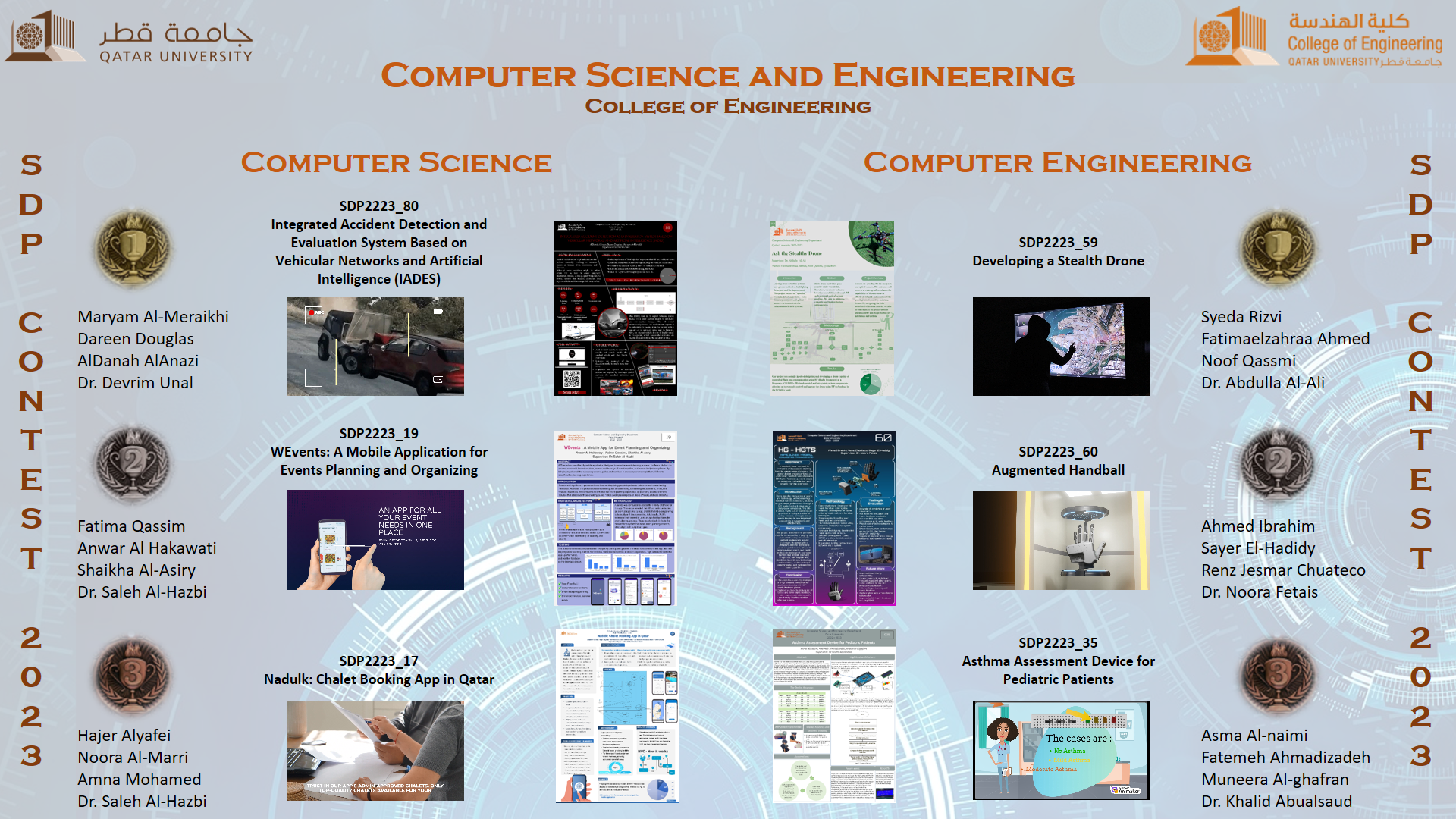
Winning Projects in CSE-SDP23 Contests Day
CE Rank 1
Project Title: Developing a Stealth Drone ‘’Ash”
Students: Fatimaelzahraa Ahmed, Noof Qassmi, Syeda Rizvi
Supervisor: Dr. Abdulla Al-Ali
Abstract :
Drones have become a popular tool for illegal activities such as political attacks, causing serious threats to global security. In order to address this issue, our project aims to demonstrate the limitations of current drone detection systems by constructing a stealth drone, which is called “Ash”. The current drone detection systems focus on detecting the drone based on it is Radio Frequency (RF) signature and its appearance using computer vision. The designed drone will be capable of operating in three different modes which are Wi-Fi, 915 MHz radio frequency signals, and autonomous mode using global positioning system (GPS). The project objectives include building the drone from scratch. In addition, communicating with the ground station on 915MHz frequency with a low signal power. The transmitted signal content is encrypted to avoid interference and intercepting. The drone will be camouflaged to evade detection by optical sensors.
In this project, we are evading the RF analyzers and the optical sensors drone detection systems. We are using LoRa technology to transmit on 915MHz using chirp spread spectrum (CSS) modulation technique, which is not commonly used by drones. This makes it difficult to be recognized by the RF analyzer as a drone communication signal. To evade detection by optical sensors, we are camouflaging the drone by adding an air balloon envelope on top of the drone’s frame. This makes it appear as a flying air balloon to the detection systems, which should confuse these systems that use computer vision and artificial intelligence.
To sum up, this project illustrates the importance of detecting drones accurately and the need for anti-drone systems to adapt to new technologies and tactics used by operators of unauthorized drones. By highlighting the weaknesses of current anti-drone systems, we aim to contribute to the development of more effective technologies to protect global security.
CE Rank 2
Project Title: Haptic Gloves Handball Goalkeeping Training System
Students: Ahmed Ibrahim, Renz Chuateco, Sayer El-Hadidy
Supervisor: Dr. Noora Fetais
Abstract:
The growing interest in harnessing Virtual Reality (VR) and haptic feedback for sports training has led to innovative approaches in skill development and performance enhancement. In handball, there is a need for immersive and accessible training tools for a wide range of players. This Computer Engineering Senior Design Project combines a Unity-based handball simulation with DIY haptic feedback gloves to create an immersive, cost-effective, and versatile training experience tailored to the needs of goalkeepers. The primary objectives of the project included developing affordable VR gloves with haptic feedback for tactile sensations in virtual interactions, creating a convincing handball simulation in Unity with various training scenarios for diverse skill levels, bridging the gap between real and virtual worlds by immersing players in an environment where they can play and feel simultaneously, and facilitating skill development by breaking down complex motor skills into subskills for targeted practice and assessment. Our methodology involved researching and identifying suitable components and techniques for constructing cost-effective DIY haptic feedback gloves, designing, and assembling gloves incorporating selected haptic feedback components with necessary hardware and software, and developing a handball simulation in Unity, focusing on realistic physics, diverse training scenarios, and seamless compatibility with the gloves. Consulting with coaches and players ensured authenticity and relevance. We implemented a system for breaking down motor skills into subskills, allowing targeted practice and assessment in the simulation, with performance metrics and data analysis providing feedback and tracking progress. Finally, we tested and validated the VR glove and handball simulation system, refining the design based on feedback from users and experts in the sport. The project successfully yielded a custom-made, affordable VR glove with haptic feedback capabilities, providing tactile sensations and force feedback during virtual interactions. The handball simulation in Unity featured realistic physics and diverse training scenarios, immersing players in a comprehensive training experience. The system demonstrated the ability to break down complex motor skills into subskills, facilitating targeted practice and assessment. User feedback and performance data indicated a positive impact on skill development and overall training effectiveness. The outcomes of this project have significant implications for the future of handball training and sports training in general. The integration of VR and haptic feedback technology offers an accessible and engaging alternative to traditional training methods. Practicing complex motor skills in a simulated environment enables players to focus on specific aspects of their performance, potentially accelerating skill development. The immersive nature of the virtual environment can help maintain player motivation and engagement. Despite limitations in replicating the full range of real-world interactions, the promising results highlight the potential for further exploration and refinement of VR-based training systems in handball and other sports. This project successfully combined DIY haptic feedback gloves and a Unity-based handball simulation to revolutionize goalkeeping training, demonstrating the potential of this platform to improve athletes’ performance and serve as a valuable training tool for handball clubs, coaches, and players across various skill levels and demographics.
CE Rank 3
Project Title: Asthma Assessment Device for Pediatric Patients
Students: Asma Alnuaimi, Fatemeh Ahmadizadeh, Muneera Alghfarn
Supervisor: Dr. Khalid Abualsaud
Abstract:
Asthma is a common lung illness that causes breathing difficulties. It affects people of all ages and generally begins in childhood; however, it can also appear in adults for the first time. There is presently no cure, but there are basic treatments that can help keep the symptoms under control [1]. This project aims to monitor asthma attacks for pediatrics under twelve years according to the following parameters: oxygen blood level, respiratory rate, and pulse rate. The resulting measures would be compared to pre-determined health standards. The respiratory rate is calculated and deduced by analyzing the result of air pressure sensor. The pulse rate and oxygen level are obtained from an oximeter. These measurements were compared with the normal health status to decide if the child has an asthma attack or not. The result is given within two minutes. The values of the three parameters and the final status of asthma are displayed on the screen. The main advantage of the project is that it is a monitoring device that can be used in a hospital or at home where parents can constantly check the status of their children in a short period of time without having to go to the hospital.
CS Rank 1
Project Title: Integrated Accident Detection and Evaluation System Based on Vehicular Networks and Artificial Intelligence (IADES)
Students: AlDanah AlAnazi, Dareen Douglas, Maryam Al-Meraikhi
Supervisor: Dr. Devrim Unal
Abstract:
Vehicle accidents are a global concern that inflates annually, resulting in massive losses in human lives, resources, and finances. Although some accidents might be minor, others can be fatal or cause long-term disabilities. Hence, in this project, we present a hybrid system that detects, estimates, and reports vehicle accidents as quickly as possible. The project’s primary objectives are saving people’s lives by reducing the reporting time, increasing the response of appropriate authorities and companies, and clearing road blockage that emerged from damaged vehicles. Consequently, the system is designed to achieve the above objectives with multiple components and new emerging technologies such as Artificial intelligence. In detail, the hybrid system consists of two devices, an AI accident detection model and a vehicle device represented in a collection of sensors, and microcontrollers. Designing a hybrid system eliminates any failure occurrence to the two devices rather than using each individually. For instance, severe accidents could damage the vehicle device and increase the likelihood of uncertain and false reported information or total data loss at worst. Moreover, previous works failed to address this, alongside estimating the accident severity from the collected data the hybrid system produces. Consequently, this project will benefit future studies and innovations by developing it into an avoidance system that aligns with the Smart Cities technology concept besides reducing physical, social, and financial costs of vehicle accidents.
CS Rank 2
Project Title: WEvents: A Mobile Application for Events Planning and Organizing
Students: Anwar Al-Hakawaty , Fatma Qassim , Shaikha Al-Asiry
Supervisor: Dr. Saleh Al-Hazbi
Abstract:
Life is full of joyful moments that are worth celebrating and creating memories that last a lifetime in individuals’ hearts. By organizing events, individuals share these memories with others as opportunities to communicate and share news and unforgettable experiences. In some communities, organizing significant events is a chance to gain reputation and status. Above all, organizing an event is not easy; what is supposed to be a happy and enjoyable time could turn into a stressful experience because organizing an event requires thinking and keeping in consideration different aspects, including the number of guests, venue, food, and drink. Moreover, the organizer has to search for good and trusted vendors to supply their needs without exceeding the budget limit. However, some people tend to avoid the daunting task and hire a professional planner. Each planner has a unique style and finding a planner that can meet one’s expectations is a challenging task. Some planners use different platforms to display their work and advertise their services. Nonetheless, some of these planners are not trustworthy as they pass off other people’s work as their own. This project aims to provide a solution in the form of a mobile application “WEvents”, that could assist people in organizing major events and finding appropriate event supplies.
For meticulous people, it is an opportunity to view and select event related items provided by different suppliers with their descriptions and price; the app will help them organize an event from scratch without exceeding the budget while recommending budget-friendly items and supplies depending on their event type. Planners can upload their contact details on WEvents, while clients can easily choose between planners and the available options. WEvents combines all types of supplies in one platform where users can easily scroll through different supplies categories. Moreover, Wevent supports local businesses; vendors and event planners will profit by being reachable to targeted audiences, thereby expanding their businesses. In this application, our goals have been accomplished by providing user friendly application that modified and enhanced traditional event planning process. Users are now able to easily and effortlessly search, filter, and organize their supplies. Also, for people who want to hire event planners they can easily find and communicate trusted companies or personal planners, we significantly improved efficiency. In addition, it is now a valuable opportunity for vendors to advertise their products and services to targeted groups of customers. Overall, our project has transformed traditional event planning into a fun, easy, enjoyable experience for everyone.
CS Rank 3
Project Title: Nadulk: Chalet Booking App in Qatar
Students: Hajar Alyafei, Amna Mohammed, Noora Almarri
Supervisor : Dr. Saleh Al-Hazbi
Abstract:
Individuals look for entertainment in life to help alleviate life’s stresses and difficulties, and chalets have become popular gathering places in Qatar due to cultural support and the fact that they are often less expensive than booking a hotel. However, booking chalets has become increasingly difficult as there is no central platform for promotion and booking as those present in other gulf countries. Customers have to ask family and friends for recommendations, and owners have to use social media for promotion and WhatsApp for booking, leading to difficulties managing communication with customers. To address this issue, a proposed solution called the Nadulk Application has been created. This application will make the process of booking a chalet easier for both customers and owners, allowing owners to manage chalet listings and customers to view photos and descriptions to book a chalet. The application is designed to solve customers and owners of chalets problems and facilitates the booking and managing chalets process using the mobile app.
Part of Computer Science and Engineering Senior Design Projects Exhibition Day 2023 for Female Students
Part of Computer Science and Engineering Senior Design Projects Exhibition Day 2023 for Male Students
On 11 June 2023, the six teams participated at the CENG Senior Project Designs 2023, and happily 3 teams out of the six were awarded again!
Our students Asma Alnuaimi, Fatemeh Ahmadizadeh, and Muneera Alghfarn won the 1st place in Best Prototype, Most Creative Design Award with their project titled: “Asthma Assessment Device for Pediatric Patients” and supervision by Dr. Khalid Abualsaud.
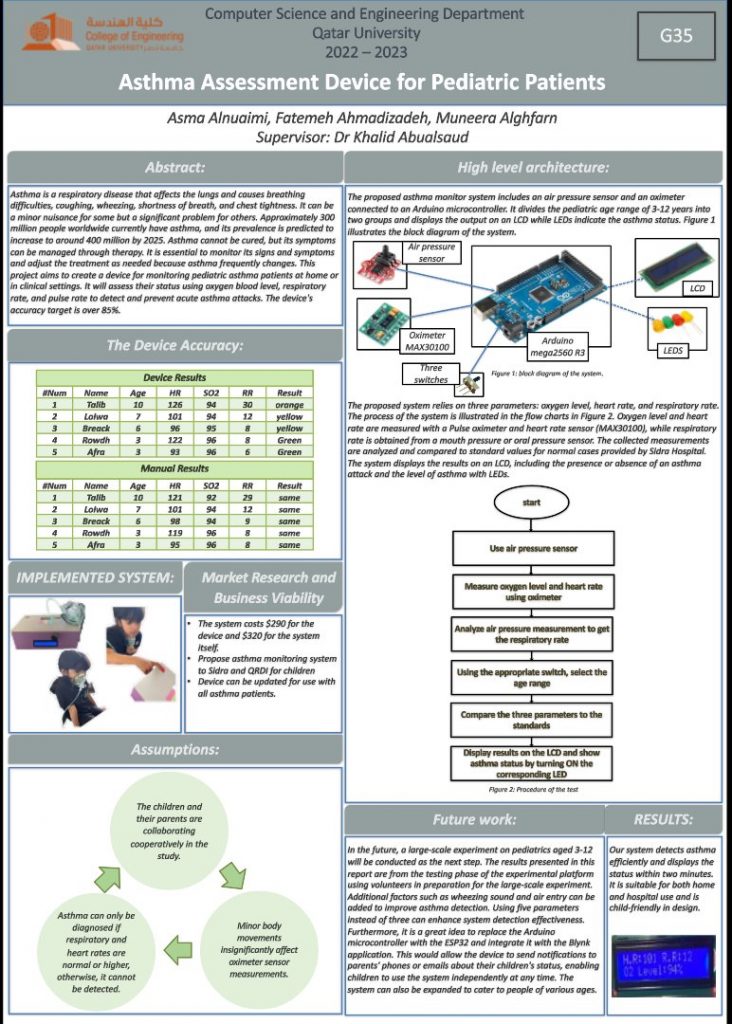
Our CSE students Ahmed Ibrahim, Renz Chuateco, and Sayer El-Hadidy won the 2nd place in Best Prototype, Most Creative Design Award, with their project titled: “Haptic Gloves Handball Goalkeeping Training System” and supervision by Dr. Noora Fetais.
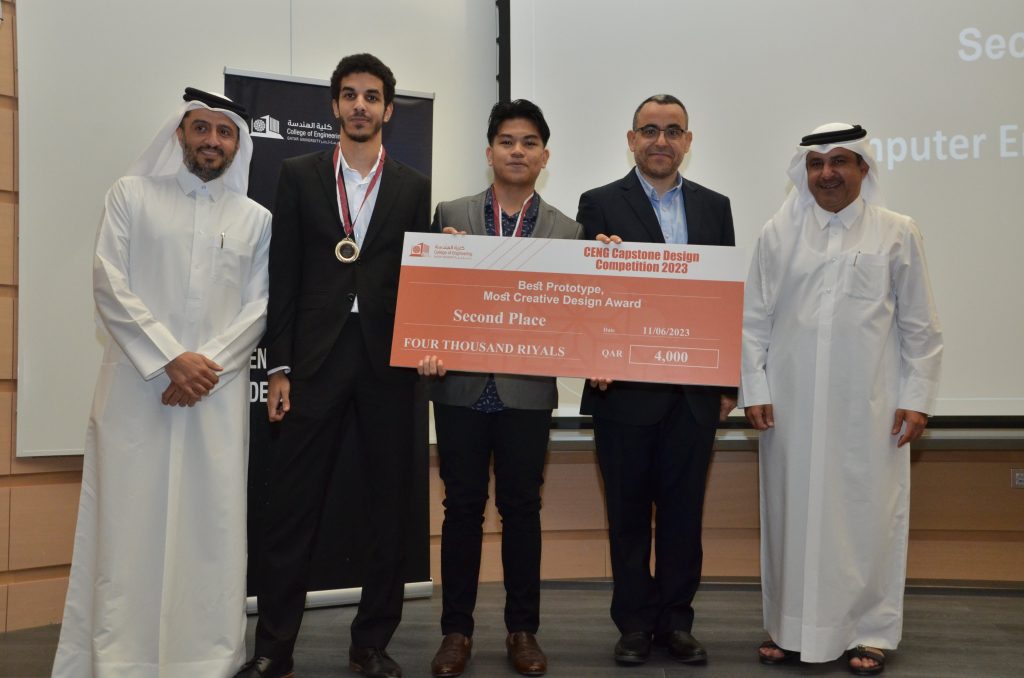
Our CSE students our students AlDanah AlAnazi, Dareen Douglas, and Maryam Al-Meraikhi won the 2nd place in Best Marketable Design Award with their project titled: “Integrated Accident Detection and Evaluation System Based on Vehicular Networks and Artificial Intelligence (IADES)” and supervision by Dr. Devrim Unal.
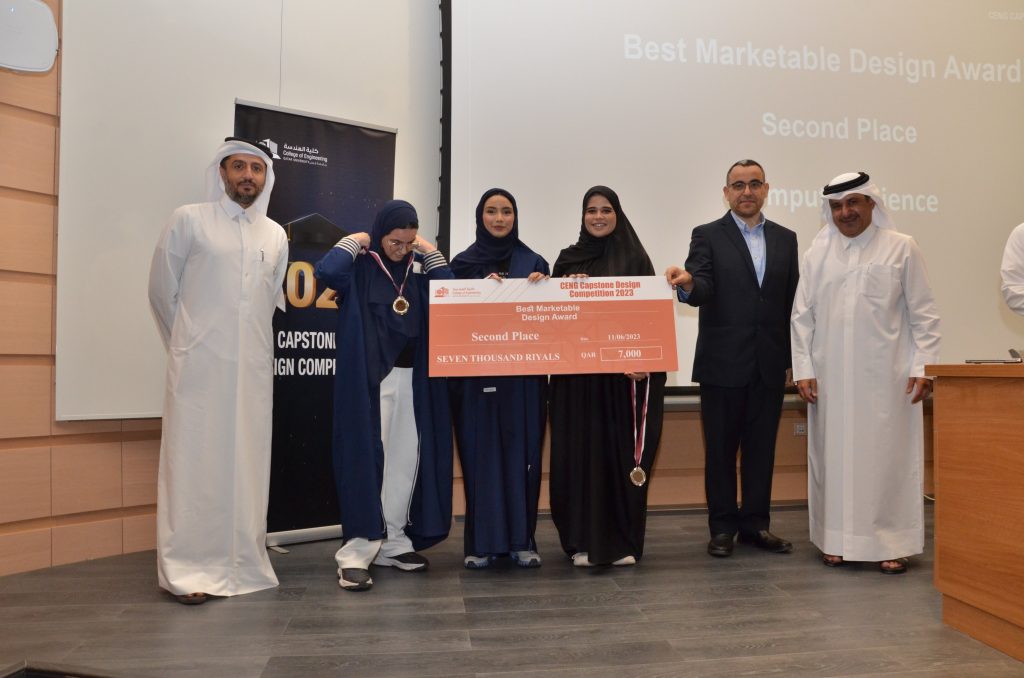
Virtual Reality Lab Project Wins Second Place in “Innovators in Education”
May 24, 2023 / Leave a comment
Qatar University recently concluded its “Innovators in Education” project in the presence of Her Excellency Mrs. Buthaina bint Ali Jabor Al-Nuaimi, Minister of Education and Higher Education, and a number of officials, deans of colleges and students participating in the project. The project is a groundbreaking initiative aimed at fostering innovative educational methods and enhancing learning opportunities for students. It brought together educators and university students to design educational resources and develop effective solutions to address challenges in the educational field. Among the impressive array of winners, the “Virtual Reality Lab: Redefining Remote Education” project claimed second place in the category of multimedia and learning software. The project is developed by the students Ahmed Ammar, Abdul Aziz Al Hams, and Mohamed Al-Yazidi under the supervision of Dr. Osama Halabi. The achievement highlights the transformative potential of virtual reality technology in redefining remote education and creating immersive learning experiences for students.
